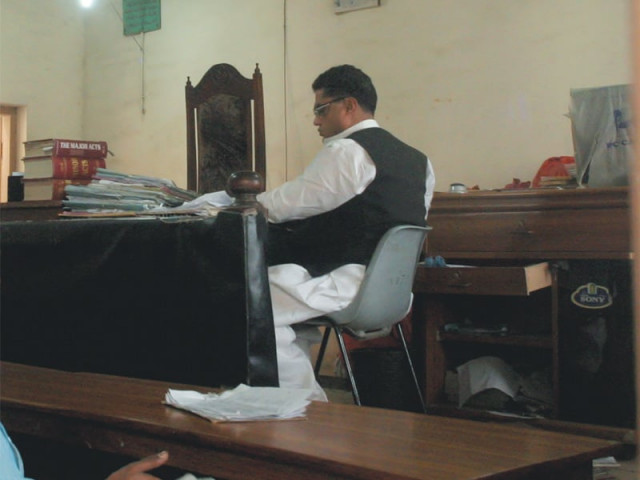Additional responsibilities: As lower courts sort out election work, cases pile up
There was a massive backlog of pending cases even before ECP gave judges more tasks.

The vacant chair of a judge at one of the courtrooms at the City Courts as seen from a broken window during a strike in 2011. Thousands of cases from the past three years are still pending at the courts. PHOTO: FILE
Hundreds of litigants have had to wait patiently as the lower courts have been swamped for over two weeks in the wake of the general elections announcement. Here judges have been ‘ruthlessly scrutinising’ nomination forms instead of handling pending cases.
This isn’t the first time that judges of the lower courts have had too much on their plates to dispose of cases. Before this, the Supreme Court had asked district judges to complete a survey of all government educational institutions, with a focus on ghost schools, and submit a report on the matter before February 14. On March 23, nomination papers started rolling in and since then, there has been a constant flurry of activity at the district and sessions courts where judges grilled prospective candidates till April 7.

Earlier, the Chief Justice of Pakistan had directed district judges to dispose of cases for the years 2010, 2011 and 2012 before March 31 and compile a monthly report on the progress made in this regard. But the Election Commission of Pakistan placed the responsibility of some electoral processes in the lap of the lower judiciary, despite the fact that the subordinate courts already had a huge backlog of pending cases to deal with. This meant that the litigants as well as under-trial prisoners - who have been kept within jails for almost three weeks - had to keep waiting for their turn.
While talking to The Express Tribune, Naeem Qureshi, the Karachi Bar Association’s president, said, “We regret whatever the prisoners and their families faced during the work [for elections]. Almost a 1,000 under-trial prisoners were sent back to jails every day.”
Qureshi said he had proposed that work related to the elections should have been started after 2pm, following regular court proceedings. He felt that the processing of nomination forms could have been handled by deputy and assistant commissioners under the supervision of a judge in each district. This would have prevented the judicial system from being clogged, he said. “This is becoming a reason for the increase in crime too,” he claimed.

The president of Malir Bar Association, Ashraf Samoo, felt the same way. “The time that should have been spent on cases was consumed in [election] work. Litigants have suffered a lot.” He said, however, that there was no other option but to assign the extra work to the judges as other institutions in the country were not suitable for the task. “They lack the decision power and the authority required to complete such tasks,” he said, while praising the judiciary. Training sessions and other work related to the elections will continue intermittently throughout April and May and prisoners, litigants, judges as well as the courts would remain busy in their own work, said senior lawyer Shamsul Hadi. “It’s not the judiciary’s job to look after the work of elections or schools,” he said. “But then again, perhaps it’s difficult to find an honest man apart from judges these days.”
Security concerns
In the face of worsening law and order situation in the city, 15 additional district and sessions judges in Karachi were conferred powers under the Anti-Terrorism Act 1997 to hear and decide any cases pertaining to terrorism. This would also ease the burden on the ATCs. Qureshi praised this step but said that thousands of people come to the city courts every day and security measures needed to be tightened. “The courts are housed in century-old buildings situated in an alarming locations,” he said. “CCTV cameras, walkthrough gates and extra police force should be approved and deployed for ATC cases.”
Published in The Express Tribune, April 15th, 2013.



















COMMENTS
Comments are moderated and generally will be posted if they are on-topic and not abusive.
For more information, please see our Comments FAQ